Share

Invisible Not Broken - Chronic Illness Podcast Network
Chronic Illness Misconceptions, Spoon Theory Explained, Handicap Parking Peanut Gallery, and How To Be Really Nice To The Spoonie In Your Life
•
“It’s not just us missing society. We are also missing FROM society”
— Monica Michelle Misconceptions of Chronic Illness
Lisen to our most shareable episode. Send our chronic illness episode to the person you wish understood chronic illness better.
Kyros' perfectly organized show notes that I systematiclly disorganized.
Misconceptions about Invisible Illnesses
Start with an explanation of Spoon Theory! https://butyoudontlooksick.com/articles/written-by-christine/the-spoon-theory/
Things we’re tired of hearing all the time:
- You don’t look sick. / You look great. - When someone says, “But you LOOK good,” we really hear, “But, I don’t believe you, because I can’t see it.”
- That if you use a wheelchair, you have to use it all the time.
- That if you have a handicap placard, you must be using someone else's, because you can’t be the one who is handicapped.
- So, are you retired / on disability then? Just because you are disabled, doesn’t mean you can get disability (SSI).
- Just because a person has a disability does not mean they are disabled. Many living with these challenges are still fully active in their work, families, sports or hobbies. Some with disabilities are able to work full or part time, but struggle to get through their day, with little or no energy for other things. While still others may be unable to maintain gainful or substantial employment due to their disability, have trouble with daily living activities or need assistance with their care.
- Therefore, if a person is displaying a license to park in an accessible parking space, try offering a hand, instead of a visual judgment. After all…the people you are graciously intending to defend, may be standing right in front of you!”
- In 1997, there were 26 million Americans considered to have a severe disability and only 7 million of them use a wheelchair, cane, crutches or walker
- But you were fine yesterday.
- You just want attention
- Munchausen syndrome or ‘factitious disorder’ – where people feign illness to gain attention or sympathy.”
- If you were really in that much pain it would show.
- A lot of pressure to not show pain / anything but a positive emotion.
- You’re too young to be disabled.
- It must be nice to get to stay home all day. / I wish I could stay home all day.
- smoking pot all day.
- We’re lazy. A drain on society. Bad parents.
- Just because we are home, we can’t contribute.
- Many people don’t realize that when you are not working, there are repercussions.
- No social contact
- Lonliness
- The benefits of interacting with people disappear
- Financial hardships
- Social isolation
- Negative stereotypes - Working is way easier that being disabled
- Have to contend with not only losing the ability to do the things you want to do, but also fight with loved ones who sometimes don’t believe us, or understand us.
- I’m mourning the loss of the life I lived before, while simultaneously fighting friends and family who treat me like it’s not real, not that bad, or that I’m being lazy.
- What do you do all day?
- You must have so much free time.
- Pressure to make the most of your free time.
- Why don’t you just go to the hospital if you hurt that much. / Aren’t you better yet?
- Doesn’t your insurance cover all that?
- Medication is a double edge sword. Sometimes you have to take 1 pill for a problem and then another for the side-effect of that first pill, and so on and so on.
- The assumption that the Doctor always knows best, because offtimes, you might be the one who knows the most about your problem/ your doctor may never have heard of your problem before.
- That doctors will keep trying to figure out what’s wrong with you without being hounded to do so.
- We didn’t do anything to deserve this or you brought it on yourself
- And this gets worse with age/being overweight because they blame everything on your age / weight
- You must feel so guilty about:
- Taking care of the kids
- Taking care of the house
- Not contributing
- Not working / supporting yourself
- Draining resources from the family
- Being a burden
- Not being able to play with the pet / walk pets.
- Just because I’m on opioids / marijuana does not mean I’m a drug addict.
- People think they understand what pain / exhaustion are like. It’s different when it’s EVERY day, not just once in awhile.
- 10.You’re so inspiring. (Well done not dying!) and trying to live up to that.
- You should either be pollyanna or crying all the time.
- Your partner must be a saint for sticking with you through this or marrying you anyway.
- We don’t want to give up. We make the effort to smile, laugh, pretend that everything is okay, look our best, and try to enjoy life as best as we can.
- This is a double edged sword though. By trying our hardest to not show pain or illness, we end up feeding into the prevailing assumption that we aren’t really in pain or sick. People assume that since we look good, we are doing better / not hurting. This couldn’t be farther from the truth.
- Sometimes the reason we try so hard to look good / not show our illness is that WE want to forget, even if just for a moment, how hard our daily life is and how much we miss the life we used to have.
https://undark.org/article/mystery-diseases-syndromes-health-care/
https://www.youtube.com/user/invisiblenomoretv
More episodes
View all episodes
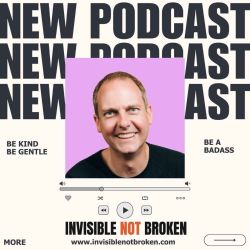
Vulnerability, Resiliency, and Advocacy with Tim Reitsma
47:06Monica Michelle is joined by consultant and podcast host Tim Reitma.Tim lives with Crohn's Disease.In this episode, Monica and Tim discuss: Tim’s resiliency through managing his Crohn’sThe importance of self-advocacy, especially in the workplace Tim’s podcast why he shares stories of those with invisible illness TIMESTAMPS00:47 - Tim's diagnosis 06:31 - How and why Tim applies self advocacy15:41 - Why Tim started his podcast22:42 - Invisible condition etiquette31:00 - What HR can do better for employees with invisible illness39:31 - Tools Tim uses to care for his Crohn’s outside the homeThe full transcript and all links mentioned can be found on the episode page on invisiblenotbroken.com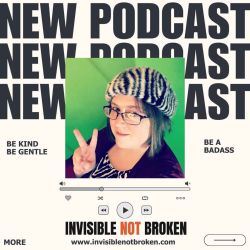
Tech and Disability: What VR Offers the Disabled Community with Sunny Ammerman
01:10:27Monica Michelle is joined by artist and disability advocate Sunny AmmermanSunny lives with Septo-optic dysplasia, panhypopituitarism, Optic Nerve Hypoplasia, and is missing a membrane in the brain called the "septum pellucidum".In this episode, Monica and Sunny discuss: Sunny’s complex disorders and how she copes with themEverything VR provides from accessible gaming, social platforms and the potential for better online education.Various VR/AR games and their gameplay Sunny’s VR support groupTIMESTAMPS00:45 - What VR/AR offers for chronically ill and disabled folks11:57 - Sunny’s conditions and how she copes with them17:55 - Features that make VR games accessible or inaccessible as well as different games and their play experiences37:13 - The social aspects of virtual gaming51:32 - What opportunities VR has for the future1:04:49 - Sunny’s VR support group The full transcript and all links mentioned can be found on the episode page on invisiblenotbroken.com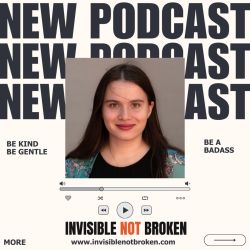
Reporting on Chronic Illness and Disability with Journalist Julia Metraux
39:16Monica Michelle is joined by Journalist Julia Metraux.Julia lives with vasculitis, mild to moderate hearing loss, and has experienced long COVID.In this episode, Monica and Julia discuss: Julia's diagnosis with vasculitis and how it influences her journalistic lensHow community impacts the mental health of those with chronic illnessHow Julia and Monica find positives and negatives in the internet spaces for chronically ill and disabled folksThe politics of how government, businesses, and celebrities influence the chronic illness community TIMESTAMPS00:32 - Julia's diagnostic journey07:02 - Julia’s work reporting on the online community of chronic illness 16:32 - The effect of Internet communities on chronically ill and disabled folks26:46 - How Julia’s illness impacts her work, both in what she writes about and how she manages her lifestyleThe full transcript and all links mentioned can be found on the episode page on invisiblenotbroken.com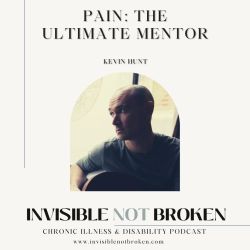
Author of “Pain: The Ultimate Mentor,” Physiotherapist Kevin Hunt
31:29Monica Michelle is joined by author & physiotherapist Kevin Hunt.Kevin lives with chronic pain.In this episode, Monica and Kevin discuss: Kevin’s philosophy of pain management as a physiotherapist who experiences chronic pain. The Hexagon Model, a life-management tool for focusing on what’s important to you.Kevin’s idea behind his new book.Using pain as a guide.TIMESTAMPS00:34 - Kevin’s work as a physiotherapist specializing in the experience of pain 06:44 - The Hexagon Model for managing your life’s needs14:00 - Putting aside the idea of a “quick fix”19:45 - Kevin’s personal experience with pain and how he uses it with patients28:44 - Kevin’s book, “Pain: The Ultimate Mentor”The full transcript and all links mentioned can be found on the episode page on invisiblenotbroken.com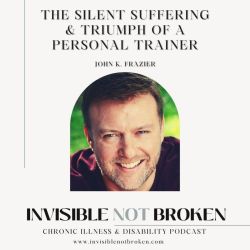
Author of “Through the Pain: The Silent Suffering & Triumph of a Personal Trainer”: John K. Frazier
28:35Monica Michelle is joined by author & personal trainer John K. Frazier.John lives with ankylosing spondylitis.In this episode, Monica and John discuss: John’s work as a physical trainer and authorChronic pain comparisonsPersonal triumphTIMESTAMPS00:50 - John’s business & diagnosis07:19 - Chronic pain olympics09:31 - Talking about & hiding a diagnosis15:09 - Personal triumph18:24 - Staying in the present23:29 - The superman complexThe full transcript and all links mentioned can be found on the episode page on invisiblenotbroken.com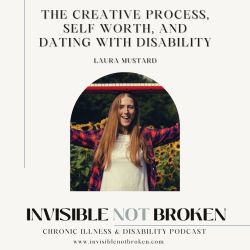
The Creative Process, Self Worth, and Dating with Disability: Laura Mustard
31:08Monica Michelle is joined by musician Laura Mustard.Laura lives with VATER syndrome.In this episode, Monica and Laura discuss: Laura’s inspiration for her upcoming musical EP.How Laura’s illness impacted her recent relationship & self-image.Laura’s creative process, new music, and social media pressure.TIMESTAMPS00:30 - Laura’s new EP / Monica’s recent COVID experience05:32 - Relationships with chronic illness11:20 - Image and self acceptance with disability15:32 - Laura’s creative process and current projects20:05 - Pursuing creativity despite social media attentionThe full transcript and all links mentioned can be found on the episode page on invisiblenotbroken.com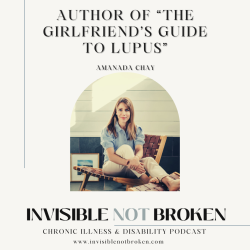
Author of “The Girlfriend’s Guide to Lupus”: Amanda Chay
30:43Monica Michelle is joined by author Amanda Chay.Amanda lives with Sjögren’s and Lupus.In this episode, Monica and Amanda discuss: Amanda’s book & diagnosisOutlooking on work & writingNavigating chronic illness with kids & familyTIMESTAMPS00:26 - Intro + The Girlfriend’s Guide to Lupus02:17 - Amanda’s diagnosis10:09 - Amanda’s outlook on writing17:11 - Navigating chronic illness with kids & family23:29 - Labels and roles26:24 - Flare reads & closing remarksThe full transcript and all links mentioned can be found on the episode page on invisiblenotbroken.com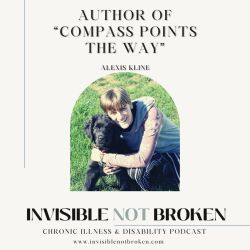
Author of “Compass Points the Way”: Alexis Kline
23:14Monica Michelle is joined by author Alexis Kline.Alexis lives with Dysautonomia.In this episode, Monica and Alexis discuss: Being a sick teenagerHaving an isolated diagnosisProductivity workflowsTIMESTAMPS00:28 - Alexis’s diagnosis & dog07:18 - Sick teenager road map10:00 - Alexis’s book & workflow16:25 - Having an isolated diagnosis20:50 - Wildlife photography, purchases The full transcript and all links mentioned can be found on the episode page on invisiblenotbroken.com
Author of “From the Sidelines to the Finish Line”: Emily Falcon
36:47Monica Michelle is joined by author Emily Falcon.Emily lives with ALCAPA.In this episode, Monica and Emily discuss: Growing up sickPost-surgery supportHaving a public bodySelf-motivation and adventuringTIMESTAMPS00:28 - Being a sick kid & Emily’s book title07:28 - Mortality10:16 - Portrayal of disability in media12:21 - Post-surgery support19:23 - Having a public body23:43 - Self-motivation29:46 - Emily’s tips for adventuresThe full transcript and all links mentioned can be found on the episode page on invisiblenotbroken.com